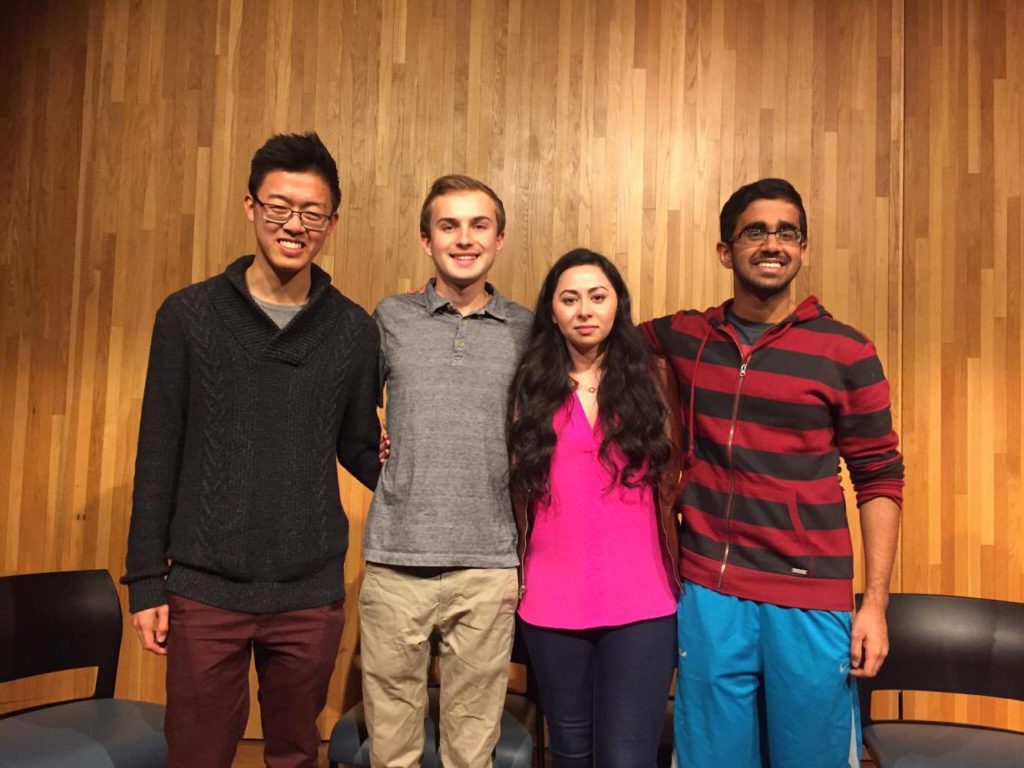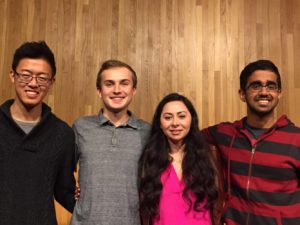
This week, the A. Richard Newton Lecture Series switched gears to hear from a new set of speakers—the students. Moderated by associate instructor Victoria Howell, these students shared their unique experiences with their peers and took questions in an engaging and organic lecture.
Sahar Yousef
Yousef, now a 5th year PhD student studying cognitive neuroscience in the Vision Science Graduate Group, eased the class into the lecture with a three-minute meditation and stretching exercise. Yousef went to Cal as an undergraduate student as well, where she studied cognitive science. She revealed her long-standing interest with the brain, and has always been fascinated with what she called the “sci-fi” concept of taking a healthy, high performing brain and working to make it more neurologically efficient—improving things like attention span and memory. For Yousef, consciousness was fascinating: the brain could only understand itself within the confines of its own cognition. When she hit a road block with the philosophical aspects of this debate, Yousef moved towards biology to enhance her understanding of cognitive health and psychology.
The PhD student now works to measure and improve cognitive capacity, engineering innovations and developing cognitive training solutions into aspects of virtual reality, therapeutics, and software. Yousef now has two paying pilot companies willing to test some of the cognition innovations from Yousef’s team of researchers. She emphasized that research like this needs to be data-driven and scientific before it reaches paying customers in the form of a stable enterprise.
When asked about the logic of multi-tasking, Yousef said she considers it a cognitive disservice, citing that the ancient brain was not built with the capacity to efficiently work with so many new and developing technologies. She recommended Lucas Miller’s “Beyond Brilliance” to the student audience.

The speakers, pictured left to right: Nathan Jin, Travis Brashears, Sahar Yousef, Divyaditya Shrivastava.
Nathan Jin
Nathan Jin, a third-year chemical engineering major, was considered more “of the earth” than Yousef’s more conceptual research. Jin explained how he brought his passion for food to campus by founding Food Science and Tech, a student group at Cal, and is now working on a food supply chain venture called ripe.io. He emphasized the growing disparity between food and agriculture. “Food is something we participate in everyday, but there’s a disconnect between how we experience foods and the agricultural system,” said Jin. He believes there is a genuine lack of understanding of the complex process from farm to consumer. The technology he’s working towards will require participation from an ecosystem of people to create change in the food industry.
Jin isn’t alone in this pursuit. He’s working alongside four other individuals with careers longer than his lifetime—all honors society characters with big backgrounds who live across the United States. Jin revealed that he spends upwards of 10 hours a week on the phone with his partners, but he thinks the venture is well worth his time. This is supplemented by the fact that two of his partners have quit their jobs to work on the venture full time, something he has contemplated as well.
The entrepreneur has learned to be accessible at all times and accept short-term planning as a fact of his busy and unpredictable life. After founding and running multiple organizations on campus, Jin knows that timelines and turnarounds can be very quick, leading to him always staying connected. “I don’t recommend it, but I’ve learned to accept it,” he shared.
Travis Brashears
Brashears is in his second year at Berkeley and studies engineering physics. He recounted his experiences in a high school mentorship program as the touchstone for his involvement in engineering at Berkeley. During his first year at this program, a mechanical engineering PhD student told Brashears he’d never become a scientist or researcher—harsh words that helped Brashears analyze what he wanted to do in his career moving forward. To prove to both himself and the PhD student that he was competent and bright, Brashears worked hard to finish the program and was invited back the next year.
His second year helped define his academic coursework for years to come. Brashears worked with Professor Philip Lubin on experimental cosmology, creating a laser system that could be sent to space to mitigate asteroid threats. Brashears was hands on during these experiments, even attaining funding from NASA. He and his colleagues realized they could use the same laser system technology to push spacecraft at relativistic speeds to get to the closest star.
The cosmically-motivated student said the program has a 50-year outline working to solidify the path to interstellar flight. Brashears noted that though this system has many practical effects on a terrestrial scale, travelling to our nearest star would be an undeniable scientific landmark. He now works with Directed Energy to continue his research and involvement in the program.
Divyaditya Shrivastava
Divyaditya “Divy” Shrivastava wasted no time becoming the CEO of his own company, called Paladin Drones. The first-year engineering student is working with local fire departments to implement drones as first responders. After a close friend of lost everything in a house fire, Shrivastava, an avid drone enthusiast, sought to reform the way emergency responders gain information. He wanted to ensure widely available and accessible technologies that would allow first responder teams to be better equipped upon arrival at fires to deal with resources, potential hot spots and explosions, and thermal ratings.
Shrivastava maintained that Cal is one of the best places to have a startup like his own. He initially applied to Big Ideas, a Berkeley startup connection that helps startups with social-related ambitions gain funding and stay on track with business plans. “They helped us nail down the individual aspects,” said Shrivastava, going on to explain that the company even provided legal counsel through a mentor.
The young entrepreneur is steadily involved in his company, applying for grants, creating pitches, and working with his team members to make sure the idea comes to fruition. He admits the company is his top priority, and he intends to stay dedicated to his project. “Right now, we’re trying to prove that (drones) can save lives by saving time,” Shrivastava shared.
__________________
The widely varied backgrounds and aspirations of these Berkeley students proved again how multifaceted and complex entrepreneurship can be, and we anticipate seeing them accomplish great feats within their respective fields.
